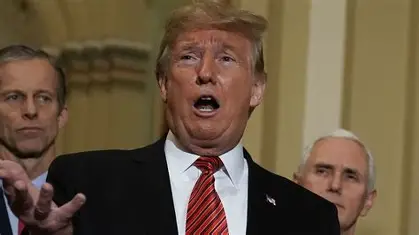Washington, D.C., October 6, 2025 — President Donald Trump has taken an unexpected turn in the escalating government funding standoff, signaling that he will no longer take the political blame for a possible federal shutdown and instead placing responsibility squarely on Congress. The move marks a sharp reversal from his earlier stance, as Trump seeks to shift pressure onto lawmakers ahead of a contentious budget deadline.
After weeks of heated negotiations and growing partisan tension, the White House announced late Sunday that Trump would not intervene further in the talks between House and Senate leaders. Aides say the president has instructed his team to step back and “allow Congress to do its job,” even as Democrats and Republicans remain deeply divided over spending priorities, border security, and healthcare funding.
In a post on his social media platform, Trump wrote, “Congress has all the tools it needs to keep the government open. If they fail, that’s on them, not me.” The statement sparked immediate reactions on Capitol Hill, where lawmakers accused the president of abandoning leadership at a critical moment.
Republican insiders say Trump’s decision reflects a calculated political shift. With public frustration mounting over repeated shutdown threats, the president appears intent on framing himself as the problem-solver while portraying Congress as dysfunctional and divided. “This is a strategic pivot,” said a senior GOP strategist. “He’s distancing himself from the chaos and betting that voters will blame Congress instead of the White House if the government closes.”
Democrats, however, argue that Trump is attempting to rewrite the narrative after months of aggressive brinkmanship. Senate Majority Leader Chuck Schumer criticized the move, calling it “a transparent attempt to dodge responsibility for a crisis he created.” Schumer added, “President Trump has inserted himself into every stage of these negotiations, and now, when the pressure is on, he’s walking away.”
Behind the scenes, White House officials say the administration’s new approach is part of a broader effort to control messaging as the 2026 midterm elections approach. Polling data shows that past shutdowns have hurt Republican credibility among independent voters, particularly when the president was seen as driving the confrontation. “He’s learned from experience,” said political analyst Dana McAllister. “Trump knows that taking ownership of a shutdown is a losing game politically.”
Still, the move has left members of his own party scrambling to interpret the president’s strategy. Some House Republicans have privately expressed frustration, saying they feel abandoned as negotiations reach a breaking point. “We’ve been taking orders from the White House for weeks, and now we’re told it’s on us?” said one GOP lawmaker, speaking anonymously. “That’s not leadership, that’s blame-shifting.”
At the center of the dispute are deep policy divides over spending levels for social programs, defense, and immigration enforcement. The Trump administration has pushed for steep cuts to federal agencies and expanded border security funding, while Democrats have demanded increased investment in healthcare and education.
The Office of Management and Budget has warned that a shutdown could disrupt key government operations, including Social Security payments, food assistance, and federal contracting. Economists estimate that even a short-term shutdown could cost the U.S. economy billions of dollars in lost productivity.
Trump’s allies say the president’s decision to step back is tactical, allowing him to position himself as an outsider demanding results from a broken system. “He’s framing this as a test of Congress,” said political commentator Mark Levin. “He’s saying, ‘I’ve done my part, now it’s time for lawmakers to deliver.’”
But critics warn that Trump’s approach could backfire if the shutdown occurs and public frustration grows. “The American people don’t care about blame games, they just want the government to work,” said Democratic Rep. Hakeem Jeffries. “If paychecks stop and services are disrupted, the buck will still stop with the president.”
As the deadline approaches, uncertainty looms over whether Congress can break the impasse. House Speaker Mike Johnson and Senate Majority Leader Schumer are expected to meet later this week in a last-ditch effort to reach an agreement.
For now, Trump’s political gamble underscores a familiar pattern in Washington: shifting responsibility, testing loyalty, and reshaping the narrative in real time. Whether the move will shield him from political fallout or deepen the crisis remains to be seen.



